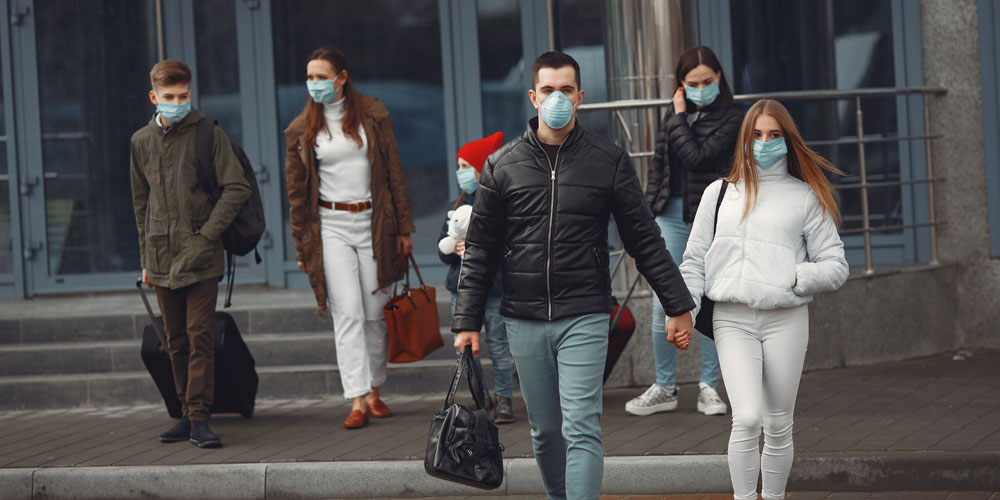What You Need To Know If You’re Travelling During The Coronavirus Outbreak

The spread of the COVID-19 virus, better known as Coronavirus, has spread rapidly around the globe and it’s thrown the travel industry into DEFCON 1 level of panic. Many travellers have questions regarding their plans and how they can go about preparing themselves in case of exposure to the new virus. Many travellers are even opting to stay at home amid fear of exposure.
The World Health Organisation (WHO) have already put specific recommendations in place for those travelling to and from mainland China and other selected counties such as Italy, Japan, Thailand, South Korea, Vietnam and a handful of others. If you are planning on travelling to the mentioned countries, you may want to talk to your travel provider to see what protocols have been put in place.
Should You Cancel Your Travel Plans?
The WHO is recommending that those with underlying health conditions and the elderly to avoid travelling to areas that are currently experiencing outbreaks of the COVID-19. This is due to the fact that the illness can be fatal for people who are above 65 years of age or who have chronic illnesses, which has been proven in almost 80% of COVID-19 cases.
There are currently cases in almost every continent. The WHO have stated to be cautious while visiting the following area (accurate as of 6th March 2020):
Asia: China, South Korea, Japan, Singapore, Malaysia, Vietnam, Thailand, and Indonesia.
Europe: Italy, France, Germany, Spain, United Kingdom, Switzerland, Norway, The Netherlands, Sweden, Croatia, Denmark, Finland, Greece, and Romania.
Middle East: Iran, United Arab Emirates, and Lebanon
Americas: United States of America, Canada, and Ecuador
Africa: Algeria
Oceania: Australia
Travelers should pay close attention to warning levels for certain areas. Warning Level 3 – the most severe level – indicated that people should ‘avoid all nonessential travel’ to that area. This currently applies to China, Iran, Italy, and South Korea.
Does Your Travel Insurance Protect Your Trip?
An outbreak of a virus isn’t usually covered under most standard trip cancellation policies. The option that you’ll need to opt-in for when taking out a travel insurance policy is upgrading to a ‘cancel for any reason’ policy. This allows travellers to cancel a trip for any reason up to 48 hours before the scheduled departure. However, it’s worth noting that you will only be refunded a portion of the trip cost (which is usually around 50-75%).
Airlines are starting to relax on their policies and some major hotel chains are waiving cancellation fees amid the chaos that COVID-19 is causing, but if you’re looking to recoup all of the costs involved with cancelling your trip, you may want to think again.
What Are The Symptoms of Coronavirus?
The symptoms of coronavirus are a lot like the flu. According to Dr. Rebecca Katz, a professor and the director of the Centre for Global Health Science and Security at Georgetown University: “You’ll get a fever, cough – it’s primarily a lower respiratory virus – general malaise, there may be come gastrointestinal distress.”
Complications of the virus could even include pneumonia or kidney-related complications which could lead to death. Symptoms of the coronavirus can appear in up to 14 days after being exposed to the virus. If you think you are showing any symptoms, Dr. Katz has recommended that you should call your doctor rather than showing up in person.
Is There A Possibility That You’ll Be Quarantined?
Being quarantined while travelling is a big possibility if a serious outbreak occurs. Travellers must be aware that there is a possibility of being stuck somewhere for an extended period of time and it’s something that you should be planning for. Once this virus has spread to more destinations, travel restrictions are going to have less of an impact as well. But this is something that will be further in the future (we hope). In the coming months there will be a considerable amount of travel disruptions, as well as public areas being shut off and major events being called off – which has already happened in Italy for a range of Serie A football games and for the South Korean tour for the pop group BTS.
Will Carrying A Mask And Washing Your Hands Actually Help You?
Practicing good hygiene is paramount to help avoid catching the virus. Dr. Katz stated that “the number one thing is people can wash their hands often. This virus spreads when you touch a thing and then touch your face”. Numerous airlines are also eliminating the use of hot towels, blankets and magazines to decrease the circulation of germs. It has been stated that an effective way of washing your hands to ensure that you kill a large percentage of bacteria and germs is to sing ‘Happy Birthday’ to yourself twice, which should take up about 20 seconds of your time.
Wearing a mask can really help in a situation like this. Certain occupations are now being permitted to wear facemasks while working. For instance, employees on Thai Airways are now wearing facemasks while on board their flights to protect themselves and the general public. Wearing masks can be beneficial in large crowds as there is a higher risk of coming across an individual with the virus. Large crowds are hard to avoid, but having a mask with you will go a long way in preventing catching the virus.

